- Matthew Amundsen
- Albums and Singles

Using a variety of thrift store horns, a whinging pump organ, and a de-mechanized player piano, Harbeson rarely plays it straight, instead infusing these compositions with unexpected and sometimes gleefully bizarre changes that add a sense of mystery to what’s ostensibly a soundtrack for visual pieces I’ll never have the chance to see. Not every song here was a soundtrack, but those that weren’t very well could have been.
When not sounding like a madman behind an organ, the horns and occasional stride piano show a jazz influence while the light and dreamy atmospheric piano evidences a fondness for the impressionistic classical music from the turn of the 20th Century. These tracks are a lot of fun, yet I can’t help feeling that I’m missing something knowing that these were often performed in tandem with puppet shows or a dance. Alas, that aspect I’ll have to leave to my imagination.
Read More
- Matthew Jeanes
- Albums and Singles
Lycia is one of those acts that built a loyal following behind a giant wall of a discography that always left me a little baffled. I saw them live once around the time this record was initially released on Projekt and I remember thinking then that it sounded a bit like elements of the Cure and Cocteau twins exaggerated into the most obvious of clichés and then spit back out. The guitars can be pretty, but they serve a sort of empty purpose for me; the bass lines could be ripped straight from Pornography or any darker-era Cure disc; and the drums are almost relentlessly drowned in cathedral-verb to make everything sound like a funeral procession or cave recording.
The net effect is that what is meant to sound somber and sincere comes off as nothing but cartoonish. I can't listen to the record without thinking of the many friends I've had over the years whose apartments smell like cloves or incense, and have sheer black fabric draped over windows with rubber bats and skulls everywhere. It's fine to have some attachment to a scene, but good music ought to exist outside of any of that. I am sure that to a great number of Lycia fans and folks who litter their apartments with black candles, the fact that Lycia is a quintessential goth (or darkwave?) act is a good thing, but the music fails to work outside of that aesthetic. And I guess that's where the very concept of a reissue of a disc like this fails on me. Who is this for? What fans of this music don't already have access to these records, and what audience is left untapped? It seems to me that the best thing to do with records that fall out of print like this is to put them online so that new kids being indoctrinated into whatever scene finds these discs necessary can find them easily and without the cost associated to any of the parites involved in making new plastic discs.
Read More
- Administrator
- Albums and Singles
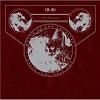 For all of The Ties That Blind I may as well be listening to any other one of a number of Neurosis clones that have emerged in the last five years. Even Neurosis sound jaded playing in the chin-stroking style they pioneered, so when a band like Mouth of the Architect trot out the same formula it gets to be a pain. The band play well but I question the necessity of another album that is too familiar the first time I hear it.
For all of The Ties That Blind I may as well be listening to any other one of a number of Neurosis clones that have emerged in the last five years. Even Neurosis sound jaded playing in the chin-stroking style they pioneered, so when a band like Mouth of the Architect trot out the same formula it gets to be a pain. The band play well but I question the necessity of another album that is too familiar the first time I hear it.
Translation Lost Records
This sort of metal was exciting when Neurosis mapped out its rough geography years ago. It was even exciting when Isis made a few albums surveying the finer details of the landscape but today, with dozens of bands crawling from the already flaky woodwork I find it hard to get excited about this “thinking man’s metal.” Mouth of the Architect at least make a decent stab at it, the music on this album is a lot more solid than the vast majority of the recent competition. There are moments where they break out of their shouty vocals and slightly challenging time signature riffing to add something new to the outdated blueprint. “Harboring an Apparition” starts off completely clean with only a slight reverb on the guitar. The reverb gets longer as the melody is repeated which gives a delicate intermission to the album. The song returns to the huge riffs but these two minutes of something different have freshened up the tired sound to some degree.
Unfortunately the rest of The Ties That Blind is too run of the mill to stick in my memory. When listening to the album I forget who it is although in the band’s favour I do think of them in the same company of good artists. Songs like “Carry On” and “At Arms Length” are cracking examples of rocking out. The sound is well produced and polished enough for it to sound impressive but not to remove the grit. There’s no point during the album do I think that the music is bad or that they shouldn’t have done that song. And this is what kills me about the band: they are good and obviously talented but locked into a sound that is not their own nor is it in any way distinctive.
Perhaps the saddest thing about The Ties That Blind is that by the end of the album I’m running to the CD player but not to press play again; I’m running with a Neurosis album to put it in the player in place of Mouth of the Architect. If they can tease out a more original sound on future releases I will be the first to champion them but if Mouth of the Architect continue down the identikit metal path I’m afraid I won’t be following their career.
samples:
Read More
- Administrator
- Albums and Singles
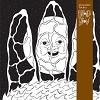 The new album by Alexander Tucker is pure bliss. I had high expectations of this release and they have been more than met. Taking his droning, folk improvisations further than before, Furrowed Brow is his best work yet. In the short time I’ve had this disc I’ve found it impossible to stop listening.
The new album by Alexander Tucker is pure bliss. I had high expectations of this release and they have been more than met. Taking his droning, folk improvisations further than before, Furrowed Brow is his best work yet. In the short time I’ve had this disc I’ve found it impossible to stop listening.
ATP Recordings
Tucker sounds like he’s following a tradition that has long been neglected, focusing not on ageless songs and ideas but on ageless feelings captured through his droning miasma of acoustic guitar and mandolin. Hanging around with Stephen O’Malley has obviously had an effect on him because, in addition to the pastoral sounding music, Tucker includes mighty downtuned riffs. Unlike Current 93 who have also recently been adding to their music guitars that belong more to the realm of doom metal than to folk, Tucker doesn’t use these sounds to turn the mood a blacker shade of apocalyptic. Furrowed Brow is anything but apocalyptic, it is hopeful sounding.
“You Are Many” kicks off the album in fine style. Multi-tracked acoustic guitars form a dense, rhythmic backing for a choir of Tuckers to sing over. The lyrics aren’t anything exceptional (“Words can’t be all these things we want to believe”) but the conviction with which Tucker sings them gives the words a lot of weight. He layers his voice and makes some fantastic sounding harmonies with himself; he does it so well it sounds like it is one otherworldly voice. When the mandolin solo erupts it brings a big smile to my face: this is a truly wonderful song. As Furrowed Brow continues it's clear that this opening song is in good company: each of the subsequent tracks are of a similar calibre, if not always of the same style. The next piece, “Superherder,” at first sounds like an Angels of Light outtake, Tucker’s strumming here is very reminiscent of Michael Gira’s style. Without warning a grindingly low and overdriven guitar line shatters the peace of the piece. The intense wall of acoustic guitars and doom-laden electric guitar eventually breaks and disintegrates into a drone.
It’s tiring but rewarding work listening to Furrowed Brow as some of the tracks sometimes sound a little similar to each other. I put this down to Tucker exploring various different looping and layering techniques using mostly the same instrumental palette. It all sounds exceptional as he has obviously worked hard on this album. One especially impressive display of on the fly looping and manipulation is found on “Broken Dome.” What starts off sounding like mobile phone interference turns out to be Tucker’s voice. As the piece progresses I come to recognize it from his recent performance at the Supersonic festival. This, and the couple of others tracks that sound familiar, sounds an awful lot better in the studio. The pressures of playing this music live (plus the fact that he had equipment problems during his performance) mean that in the more relaxed confines of the studio the songs can come to life properly.
samples:
Read More
- Administrator
- Albums and Singles
 Most of the Arthur Russell material (re)issued by Audika Records so far has been in the idiosyncratic chamber-pop mold (World of Echo and Calling Out of Context), with the recent First Thought Best Thought collecting the artist's orchestral works. In contrast, this CD contains material much closer in style to the "Mutant Disco" of Russell's classic Sleeping Bag 12" sides, packaging never-before-released avant-dance tracks alongside a DFA remix and a scattering of rare material.
Most of the Arthur Russell material (re)issued by Audika Records so far has been in the idiosyncratic chamber-pop mold (World of Echo and Calling Out of Context), with the recent First Thought Best Thought collecting the artist's orchestral works. In contrast, this CD contains material much closer in style to the "Mutant Disco" of Russell's classic Sleeping Bag 12" sides, packaging never-before-released avant-dance tracks alongside a DFA remix and a scattering of rare material.
"Springfield" was one of the last songs Russell recorded before his untimely passing, and in fact he never got the chance to fully mix the separate tracks. To remedy this situation, Audika enlisted the help of the DFA's Tim Goldsworthy and James Murphy, who did some posthumous guesswork and pieced together the song in the way Russell most likely intended. It certainly sounds like a Russell track through-and-through, from the oddly syncopated rhythm track to the peculiar use of echo, from the buoyant keyboards, trumpets and swathes of cello to the strangely hypnotic development of the song. The song is pure electro-disco dub as only Russell could envisage it, right down to the repetition of his oddly soulful, throaty vocals on bizarrely mundane lines like: "I have never been kissed/I can sit on metal steps." The song unfolds at a leisurely pace, a full eight-and-a-half minutes, undeliably groovy but also strangely obtuse and undanceable, just like the finest moments in Russell's disco catalog.
The DFA utilize an alternate vocal take for their remix of the track, eschewing some of inscrutable, primitive qualities obfuscating Russell's original, to create a track with cleaner edges and greater dancefloor appeal. In contrast to many of the DFA's best remixes, however, Arthur Russell's identity comes through loud and clear, despite the duo's considerable remixing efforts. It must simply be difficult to obscure Russell's unique signature sound, so the DFA opt instead to bring it into sharper focus, shedding layers of enigma and ending up with something even more infectious and monumental than the original.
The most fascinating moment on the remainder of this EP is "Corn #3," from the planned but never-released 1985 album Corn. The song combines Casiotone keyboard progressions with tribal rhythms, noisy cello scrapes and sampled water sounds, evoking an alien rain forest that seems inviting rather than hostile. Accounts by friends and associates note that Russell wanted his music to have a universal appeal and acceptance, which stands in contrast to the downright oddness of which he was capable, and yet one can hear such utopian aspirations in a track like this.
Also on this CD is an early version of "Let's Go Swimming" entitled "See My Brother, He's Jumping Out," which finds the track in a nascent form, not yet the sprawling, spacious masterpiece that it later became. "Hiding Your Present From You" is another alternate version of an affectionate pop song that also appeared on World of Echo as well as the iTunes-only Let's Go Swimming EP. Ditto the fantastic but grammatically awkward track "You Have Did the Right Thing When You Put That Skylight In," a paean to getting more sunlight in your house, which has previously appeared on a Wire Tapper compilation as well as on the aforementioned download-only EP. However, the track deserves to be heard again, as it is a masterpiece of what the Audika press release dubs "heavy metal cello," Russell using over-amplified, plugged-in cello to create a dense wall of shoe-gazy noise that sounds monolithic, but incongruous accompanying the conversational lyrics, Russell extolling the virtues of his friend Ernie Brooks' newly-installed skylight.
With the exception of the stunning DFA mix, this package is strictly fans-only, although for those who take the time to appreciate Russell's unique and alluring soundworld, this CD will further enhance the appreciation of just what a remarkable, versatile and talented songwriter and musician the guy really was.
samples:
Read More
- Administrator
- Albums and Singles
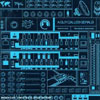 His most relevant work in what seems like ages, Gerald Simpson's latest matches the feverish vitality of the early acid house era without resorting to Vibertian schtick or pure retro reproduction.
His most relevant work in what seems like ages, Gerald Simpson's latest matches the feverish vitality of the early acid house era without resorting to Vibertian schtick or pure retro reproduction.
The reductionist Proto-Acid, a 71-minute storm of bleeps, bass, and beats, plays like a distant cousin to Simpson's classic "Voodoo Ray" and his recordings with the once-mighty 808 State, as well as the Motor City innovators that made these classic works possible. Produced live on two laptops and a mixer without any additional hardware, it thoughtfully re-imagines techno as if in an alternate timeline, one in which the rave scene's dumbed-down degeneracy and laughable neo-hippy nonsense never materialized. The results of this endeavor wont find their way into the record crates or hard drives of posturing celebrity DJs playing for sweaty meatheads and obnoxious bimbos across the globe, nor will they play to the demographic needs of trendy advertising agencies. This is, unquestionably, to Simpson's credit.
Opening with the bleating electro blasts of "Marching Powder", this 24-track mix flows smoothly with its mostly shorter passages alongside a few slightly longer pieces that vary enough to keep the inherent sameness from turning monotonous. "Monday" utilizes filters with exceptional creativity and ease before easing into a subtle stabbing melody that refuses to overtake the general groove no matter how tempting. For Simpson, the mix seems just as important as the music itself, a methodology worthy of reverence. The 303 emulator finally makes a boastful appearance on "Bumpt", its gurgling tones recalling the old Plus8 records I still can't get enough of. The last minute or so of "Night Flight" ushers in a somewhat more jacking vibe that pays tribute to the unmistakeable sound of Chicago house, as is demonstrated on the subsequent "Scaffolding" and the ultra-techy "Bass-O-Tran". 'Proto-Acid' closes with two now-uncharacteristically lengthy cuts, the minimal yet epic "Voltar" and "Sweet You".
Much has changed since Simpson's glory days, though this fantastic disc demonstrates that maturity hasn't dulled the man's innate ability to construct emotive tapestries from unfeeling machines. Those who have chosen to ignore A Guy Called Gerald's output for the last decade should take this opportunity to welcome him back into their lives once more.
Read More
- Administrator
- Albums and Singles
 The latest album by Bardo Pond is a corker. Many of the pieces on Ticket Crystals combine floaty and sparse playing with heavy concrete dirges. Mostly this formula pays off in spades and only rarely does the album lapse into mediocrity. Some great songs on this CD make the lesser ones seem worse than they really are, overall even mediocre Bardo Pond is still worth listening to.
The latest album by Bardo Pond is a corker. Many of the pieces on Ticket Crystals combine floaty and sparse playing with heavy concrete dirges. Mostly this formula pays off in spades and only rarely does the album lapse into mediocrity. Some great songs on this CD make the lesser ones seem worse than they really are, overall even mediocre Bardo Pond is still worth listening to.
“Destroying Angel” is an apt title for the cataclysmic opening track. Isobel Sollenberger and Christina Madonia’s dual vocals remind me of Neil Young filtered through a large dose of hallucinogens. Their voices sound sweet, but with the fuzzed out backing of guitar, drums and bass it somehow feels like the end of the world. When Sollenberger steps back from the mic and starts soloing on flute, the song really kicks off. To start an album with such an amazing song is unfortunate, as it is inevitable that subsequent songs will compare unfavorably to “Destroying Angel.”
The rest of the album doesn’t ever quite equal the fury and intensity of the first song, but that’s not to say the other songs aren’t good. Bardo Pond are masters of the slow burner, tracks like “Isle” and “FCII” which take a few minutes to really take off. When Bardo Pond get up to speed—though their pacing is always deliberate—it is impossible not to pay full attention. Even as I write this, I've got the album playing, and I keep drifting off during “FCII.” Once the different elements of the piece fall into place, the beautiful swirling guitars and violin play over a drum and bass groove that is heavensent and magical.
This brilliance is not sustained throughout, and there is the odd throwaway track like “Lost Word,” which feels underdeveloped. This is fine to be stuck in the middle of the album, but on repeated listens, I have felt the need to skip it. It could easily have been left off the album. “Moonshine” took a while for me to get used to, as for the first couple of minutes it resembles it veers rather close to the dreaded hippy drum circle jam, not my favorite musical mode. However, like a lot of the music on Ticket Crystals, once the band launch into heavy guitar drones and psychedelic bombast, the music blossoms.
Ticket Crystals may not be perfect but it has impressed me greatly. Bardo Pond have on this album, barring the odd exception, managed to combine fiery and blistering heaviness with an airy delicateness. I can see myself coming back to "Destroying Angel" regularly, any album that features a song like this is worth having and cherishing.
samples:
Read More
- Administrator
- Albums and Singles
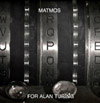 This tour-only 3" CD is a postscript to Matmos' recent The Rose Has Teeth in the Mouth of the Beast, a masterpiece of audio portraiture that payed homage to queer heroes. This three-song EP continues the theme, taking as its subject the mathematician, philosopher, cryptographer and homosexual martyr Alan Turing, and featuring the vocals of David Tibet as well as sounds sourced from a functioning Enigma Machine.
This tour-only 3" CD is a postscript to Matmos' recent The Rose Has Teeth in the Mouth of the Beast, a masterpiece of audio portraiture that payed homage to queer heroes. This three-song EP continues the theme, taking as its subject the mathematician, philosopher, cryptographer and homosexual martyr Alan Turing, and featuring the vocals of David Tibet as well as sounds sourced from a functioning Enigma Machine.
It's easy to see why Matmos would be interested in the life and work of Alan Turing; as academics and electronic musicians, the duo utilizes the kind of "thinking machines" that Turing first conceptualized. Turing was a codebreaker working for British intelligence during World War II, and was instrumental in breaking the coded messages created by the Nazi Enigma Machine. Matmos were allowed access to a working prototype of the Enigma Machine by the mysterious Cryptography Research corporation, which they recorded and use as raw sound material for the first track on the EP. A further layer of coded signification is contributed by a complex piano melody, a hyperkinetic fugue that travels frenetically across the ivories, encrypting itself into a dizzying chaos that trips along with the clicks, whirrs, ratchets and and clinks of the Enigma Machine. Matmos seamlessly organize all of this encrypted chaos into the sort of crunchy, textured techno for which they are known. Although the methods used to produce the track are appropriate to the subject, Matmos also achieve the impressive feat of making the music seem as if it unstuck in time, curiously reminiscent of the WW2-era atmosphere and aesthetics in its own austere, nostalgic way.
The second track features David Tibet of Current 93 reading aloud from some Turing's more mystical-sounding writing ("The universe is the interior of the light cone of creation" and "The exclusion principle is laid down purely for the benefit of the electrons themselves, who might be corrupted and become charges or demons if allowed to associate too freely"). This seems an especially appropriate job for Tibet, as he is clearly interested in that ambiguous middle space between mathematics and religious philosophy, as evidenced by his extensive use of Pascalian gnosticism on Current 93's All The Pretty Little Horses. Tibet repeats Turing's sayings mantra-like, allowing their mysterious beauty to set in over time, as Matmos compound each syllable with layers of digital and analog arpeggiations, against a warm backbone of swelling organs before the track begins to dissect, mutate and recombine Tibet's vocalizations into an enigmatic tangle that even Turing might have had a hard time dencrypting. The effect is chilling and icily beautiful, a welcome respite from the mannered acoustic backdrops that we've been hearing Tibet's vocals accompanied by for more than a decade. In fact, this sounds like what I'd have liked to hear from a new Current 93 album, rather than the fascinating but turgid mess of Black Ships Ate the Sky. Reportedly, Matmos are remixing a track from Black Ships, and I'm very interested in hearing the results.
The EP ends on a lilting note of melancholy with Mellow Candle's Clodagh Simonds (of recent involvements with Fovea Hex and Current 93) tackling the well-known traditional Irish folk song "Molly Malone," the sad tale of a beautiful fishmonger. Matmos utilize the refrain of the song ("Cockles and mussels, alive, alive oh") as a cue for object sampling, utilizing sounds made from shellfish in the mix on this sublimely beautiful track, made only more ravishing by the doubling and tripling of Simonds' vocal at unexpected intervals. Haunting counter-melodies are created between the vocal layering and the funereal strings that form the melodic bedrock of the song. The significance of this song is given in the liner notes of the EP: "Faced with an imminent trial on charges of gross indecency, Alan Turing insisted upon playing [the song] on the violin for the police officers who came to his home to take his statement." The track is a lovely and elegiac way to commemmorate the genius' untimely death by his own hands, forced by the government into unorthodox hormone treatment in an ill-conceived attempt to "cure" his homosexuality.
This EP is another winner by Matmos, who should really think about packaging these three tracks along with the Japan-only track from The Rose Has Teeth ("Kendo for Yukio Mishima") for general consumption by the public, and not just those lucky enough to get a copy at their recent shows.
samples:
- Enigma Machine for Alan Turing
- Messages from the Unseen World (Featuring David Tibet)
- Cockles and Mussels (Featuring Clodagh Simonds)
Read More
- Administrator
- Albums and Singles
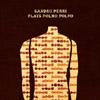 Following the 2003 release of Like Hearts Swelling, Sandro Perri began performing under his own name, incorporating more organic sounds as opposed to the processing, and perhaps overprocessing, that Polmo Polpo was regarded for. This five-track EP provides a conceptual bridge between the older sound and new sound as it began as reinterpretations of the songs from Like Hearts Swelling but has evolved a bit further.
Following the 2003 release of Like Hearts Swelling, Sandro Perri began performing under his own name, incorporating more organic sounds as opposed to the processing, and perhaps overprocessing, that Polmo Polpo was regarded for. This five-track EP provides a conceptual bridge between the older sound and new sound as it began as reinterpretations of the songs from Like Hearts Swelling but has evolved a bit further.
Originally sold as a four-song CD-R at shows, the most immediately noticable difference is its length. While Like Hearts Swelling was over 45 minutes, this one, with the same number of songs, is only slightly more than 25. The music is what would be expected from that: songs which get to the point a lot quicker than in their original form, which originally stretched to over 11 and 13 minutes at times. Technicalities aside, to me the songs only even faintly resemble the songs bearing the same names on Like Hearts Swelling.
While there's no indication on the CD that there's anybody else performing on these songs than Perri, the songs sound like they're recorded by a group, perhaps the group which has backed up Perri on live dates over the last few years. "Romeo Heart," now "Romeo Heart (Slight Return)," features what sounds like melodica, flute, bass clarinet, and strings along with some manual knob twiddling and very sparse guitar where the original tune was buried under mountains of echoes and delays, a characteristic known by some as "the MSG of experimental music." "Requiem for a Fox," however, sounds like a full band with drums, bass guitar, and vocals, barely even resembling the original, which, in its 11+ minute form took forever to get to the melody of the track, which, at best was rather meandering compared to this new take."Sky Historie" now features muted trumpet alongside the bluesy guitar and chime sounds, and like the previous track, when you add the new vocals in, it's hard to find the similarities with the original.
I'm only convinced that "Dreaming" is Perri alone, as it consists only of vocals with acoustic guitar and what could be a bass drum kick. Both this and the following "Dreaming" sound like they were recorded in my kitchen but they're both endearingly charming. I love Perri's voice here, as it's slightly whimsical but undoubtedly pretty, complimenting the rhythmic guitar, as it is on "Circles," which isn't far from form as "Dreaming."
Sandro Perri has either notably progressed in his abilities as a guitarist and arranger or he's simply less shy about his playing and singing (or a combination of the both), which is a good thing. Perhaps if he goes back to recording as Polmo Polpo, these elements will make their way to the forefront of the songs, but in the meatime, it will be good to hear a full Sandro Perri album.
samples:
Read More
- Administrator
- Albums and Singles
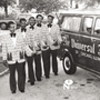 Proof that Jesus must have had soul sits in this collection of "gospel funk" songs. The grooves on these songs are as thick and rockin' as anything any secular performer put to wax, but they're all songs of praise, tolerance, hope, brother/sisterhood, redemption, and soul-fueled love. If the churches around here played this stuff at their Sunday service, I'd be there every weekend, ready to communicate with God.
Proof that Jesus must have had soul sits in this collection of "gospel funk" songs. The grooves on these songs are as thick and rockin' as anything any secular performer put to wax, but they're all songs of praise, tolerance, hope, brother/sisterhood, redemption, and soul-fueled love. If the churches around here played this stuff at their Sunday service, I'd be there every weekend, ready to communicate with God.
The Numero Group
By this time Numero Group may not need an introduction. To be clear, however, the folks at Numero go deep-record diving and release music from the prisons of unused 45 singles and geographically confined locations. They've released music from across the world, spanning genres that have nothing to do with each other and, with the advent of Good God!, they've now pulled together a collection of music from a "genre" that never really existed. The notion of funky gospel might not be entirely alien to everyone, but the second this record comes on and "Jesus Rhapsody" by Preacher and the Saints starts up with a low-end groove and a pounding drum track, it's pretty evident that this collection is something special. There's more than just funk here, there's a sexy soulful delivery at work in these songs of praise. Imagine that, a little something special in the ecstasy of religion.
There's not a cut on this compilation that doesn't deserve to be talked about. The push of congo lines, the heavy thump of a drummer going crazy beside the chants and cries of a choir, a completely out of this world cover of the classic "Wayfaring Stranger," the movement of a wah-wah pedal through the shouts of a preacher, and many others make every song feel extra special. The albums that some songs were pulled from weren't as funky as what's represented here. Numero is careful to detail (in their excellent booklet) that gospel funk wasn't really a movement or a genre. These are choice cuts from records most lovers of funk probably wouldn't have ever bothered listening to. Every track on here is bursting with an energy that's has no comparison, but it's just as likely to make people dance and sing as it is to bring people to the light of their Lord.
No matter how much I feel religion is responsible for some of the worst atrocities the world has ever seen, this disc reminds me that love, compassion, concern, peace, and happiness all have some kind of spiritual root or that the spiritual must participate in those things somehow. It's hard not to feel good, not to move along to the funk that these worshippers threw up to the heavens. This is funky and soul, not doubt, and all at the same time there's an extra spark, and I'll dare to call it divine, that pushes these songs over the edge and into a high-class division that's all their own.
Any sort of discrimination shouldn't keep anybody from tuning in to something that represents a good portion of the American landscape and of American musical history. This is the stuff that the USA is made of (at least, in part) and, happily, there's as much joy in these songs as there is sadness. For every seemingly crushing event there's that bit of hope and celebration in this music that makes it utterly priceless. Besides all that, every song on here is incredible: a perfectly balanced blend of rhythm and blues, soul, and songs of praise. It makes all the gospel that's selling at the local major chain stores sound dull, like the product of some helpless and unimaginative individuals who don't really know how they feel or what they believe. The message that bleeds out of the speakers on this collection is unmistakable: "Music can cure us of our ills! Praise Jesus!" Be it right or wrong, it is a powerful and beautiful thought and it drives some of the most fun and upbeat music I've ever heard. Hallelujah and amen, then: for once I feel like those words are appropriate.
samples:
- Voices of Conquest - Oh Yes My Lord!
- Trevor Dandy - Is There Any Love
- Shackleford Singers - God Is All Over Me
Read More
- Matthew Jeanes
- Albums and Singles
Cavalcade of Glee... is, to my ears at least, quite a bit more restrained and straight forward than I would have imagined. It seems that Funk may be skipping past the impulse to make a more fucked up and twisted noise than before in favor of honing in on songwriting. Of course this is bound to confound the legions who want to slow down his tracks, deconstruct his beats, download his software, and pick apart the magic that is making music with computers. What's interesting about this is that with this album at least, the real accomplishment is not how nervously tweaked the rhythms and melodies are, but how cleanly and thoughtfully the songs are put together. The sample spotters and software hackers are asking all of the wrong questions if they want to get to the bottom of this mojo, because it's not the tools and gigabytes of RAM that make this record work—it's the attention to the art of writing a song.
It seems simple enough—if you want to release an album, you ought to first start with some songs, but that's a path that many who make music with computers tend to skip entirely. What makes this record listenable and distinct is that the songs have hooks, the melodies are developed to build over time, and the silly spray of samples actually helps give the songs character rather than feeling like obligatory sonic detritus.
Breakcore records, producers, mp3s, and shows are pouring out of odd basements and garages all over the place now. The scene as a whole has few standouts and hundreds of copycats releasing music that is often indistinguishable. Funk's own discography is so abundant that by the time this review will be published, it's probably not even going to be a review of his latest release. Still, what is now setting Venetian Snares apart from the imitators is his ability to congeal the furious elements of a niche genre into something that transcends that genre.
Read More

